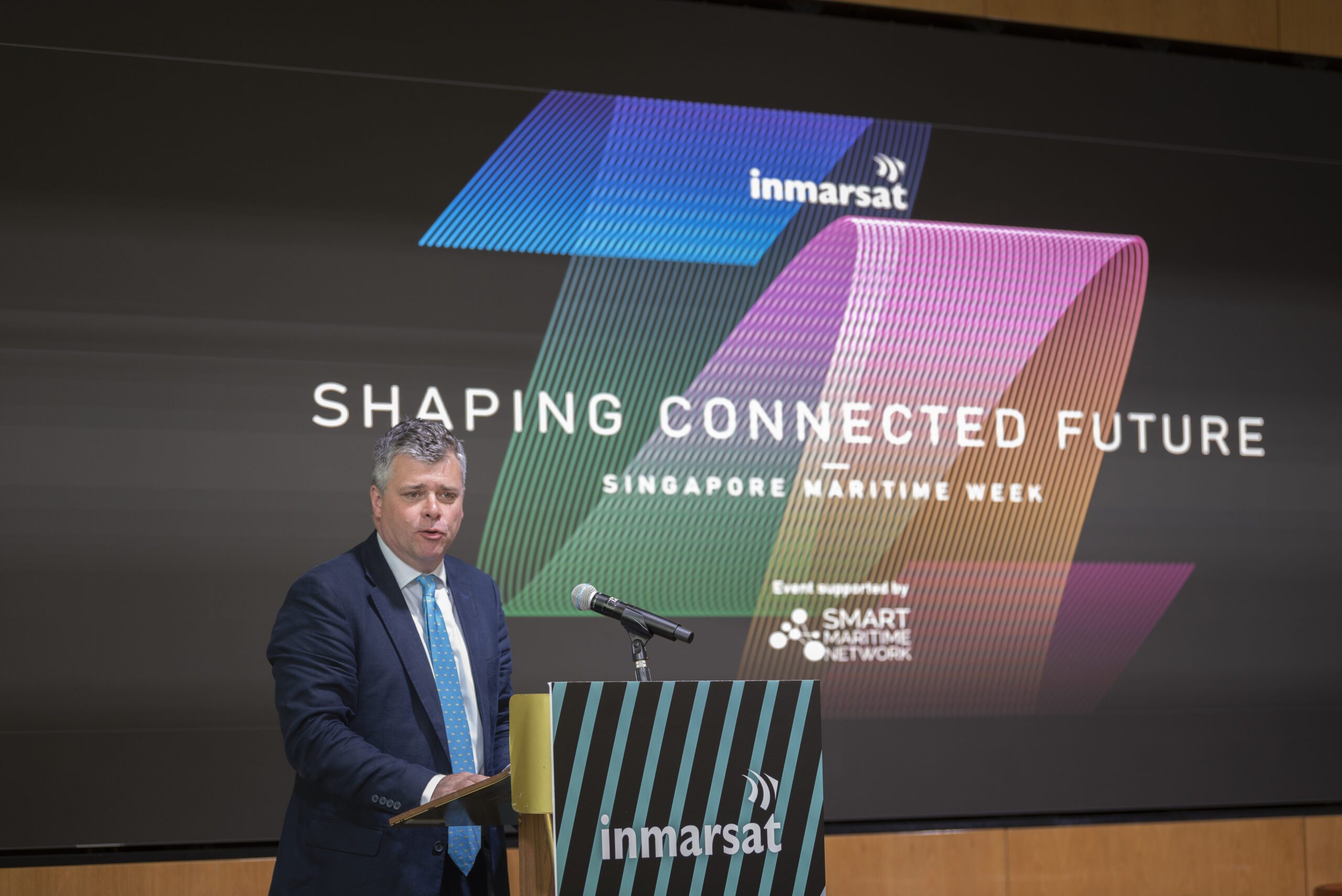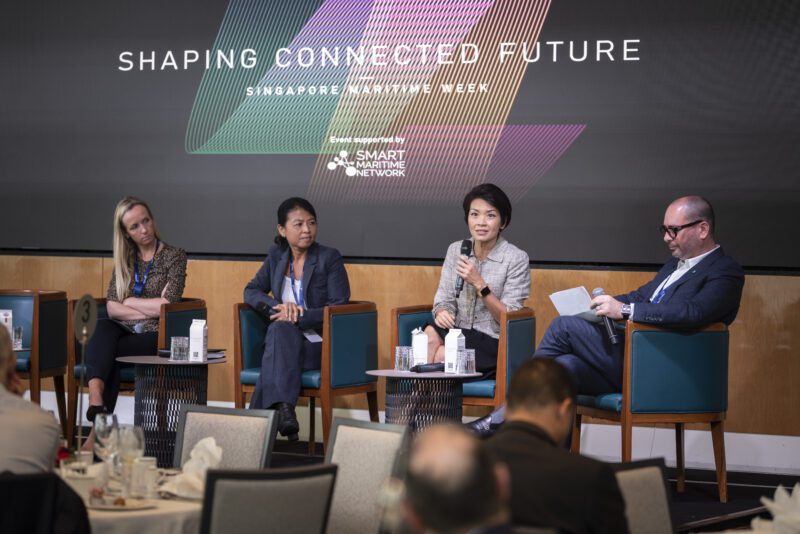ABB to supply integrated power system for nine shuttle tankers
In a major step towards more efficient offshore operations, Samsung Heavy Industries Co., Ltd. (SHI) and ABB have signed an agreement to equip a fleet of shuttle tankers with ABB’s...

Partnerships, consortiums, and combined studies will be pivotal to the realisation of zero-emissions shipping.
As the second of two panel discussions at Inmarsat’s Shaping Connected Future Seminar during this year’s Singapore Maritime Week, Sustainability: Delivering Change explored how the maritime industry could enable high-value connected solutions to address its environmental challenges.
Moderated by Chakib Abi-Saab, Chief Technology, and Innovation Officer at Lloyd’s Register (LR), the discussion drew on the insight of panellists Elisa Woodward, Chief Operations Officer, Vallianz Holdings; Lynn Loo, Chief Executive Officer, Global Centre for Maritime Decarbonisation (GCMD); and Sarah Greenough, Head of Maritime Sustainability and Supply Chain Excellence, BHP.
Lynn Loo opened proceedings by explaining that GCMD, as a “neutral convenor”, can add value in particularly complex pilots and trials by “bringing people across the sector together to collaborate”. As an example, she pointed to GCMD’s carbon capture pilot, which, unlike most comparable trials, covers not only the initial capture of carbon dioxide but also its offloading and recycling. Various stakeholders are involved in the project – including LR as the appointed classification society – and this level of collaboration, Loo explained, will be vital to creating “end-to-end solutions” for maritime decarbonisation.

Reiterating the importance of collaboration, BHP’s Sarah Greenough commented: “Industry forums and consortiums provide the opportunity to bring together a cross section of the industry – vessel owners, fuel providers, class and charterers – and that’s how we will achieve rapid change. It is equally important that we rethink our relationships in the ecosystem so that competitors become partners in developing green corridors and aggregating demand to influence the industry at a much faster rate.”
Expanding on Greenough’s point, Elisa Woodward of Vallianz described “non-equity partnerships” as a vital element in realising environmental ambitions. “To achieve your decarbonisation goals, you need to look across the ecosystem to find the right partners – because there’s no way you can do it by yourself. Commercially, it’s just too difficult. Collaboration is key to making things happen.”
According to Greenough, “ecosystem partnerships” are one of the two “critical enablers” of BHP’s decarbonisation strategy, with the company working together with other organisations to deliver on future fuels or onboard innovation, for example. The other critical enabler is “data democratisation”. Having successfully used data analytics to optimise safety and cost efficiency, BHP increasingly examines the sustainability credentials of its chartered vessels, measuring emissions in real time to inform its chartering choices, said Greenough.
Emphasising the role that charterers can play in elevating industry-wide sustainability standards, Woodward referred to a leading energy company to which Vallianz provides its offshore services. The charterer requires service providers to demonstrate environmental measures such as energy-saving devices (ESDs) or digitalisation strategies when bidding on a contract, Woodward explained. “Older vessels even need to be converted to be eligible for the tender process.”
While ship owners such as Vallianz are responding to these demands, charterers themselves are facing pressure from consumers. “BHP produces nickel for electric vehicles, and the end customer wants full traceability from mine to car,” explained Greenough. “These expectations force businesses to put systems in place to trace emissions throughout the value chain, and this is something we will see more of in shipping, too, as the sector is held to higher levels of accountability.”
Despite the industry facing mounting pressure to minimise its environmental impact, a recent survey conducted by GCMD in partnership with Boston Consulting Group serves as a reminder that not every maritime company moves at the same pace. Of the approximately 130 owners and charterers surveyed, 70% described decarbonisation as “very important”, but only 50% reported having a net-zero target in place, and even fewer – 30% – had established a “pathway to net zero”. These companies, Loo said, can be divided into three groups: “frontrunners”, “followers” and “conservatives”.
“What we found is that the pain points for the frontrunners differ from those of the conservatives,” she explained. “The frontrunners worry about technological uncertainty and commercial viability, but the conservatives haven’t even established a decarbonisation strategy or division, meaning education and contextualisation are crucial for this group.”
Given the significant proportion of ship owners and charterers falling into the conservative category, Loo continued, “education is a low-hanging fruit for GCMD and classification societies like LR. If we can properly contextualise the problem and the portfolio of solutions available, it goes a long way to bringing the conservatives up to speed.”
With maritime decarbonisation ultimately dependent on the widespread deployment of alternative fuels, GCMD recently conducted a pilot study aiming to define operational and safety guidelines for ammonia bunkering. Pending regulatory approvals, the project will facilitate the first ship-to-ship transfer of ammonia in the Port of Singapore. “The idea is to take baby steps, to build confidence and competence in the ecosystem,” said Loo.
In the meantime, cost-effective, interim solutions like slow steaming and ESDs can help maritime companies to reduce their carbon footprint and comply with existing regulations. However, as the panellists agreed, delivering the change needed to achieve zero-emissions shipping will rely on collaboration throughout the industry.

Sign up for gCaptain’s newsletter and never miss an update

Subscribe to gCaptain Daily and stay informed with the latest global maritime and offshore news


Stay informed with the latest maritime and offshore news, delivered daily straight to your inbox
Essential news coupled with the finest maritime content sourced from across the globe.
Sign Up